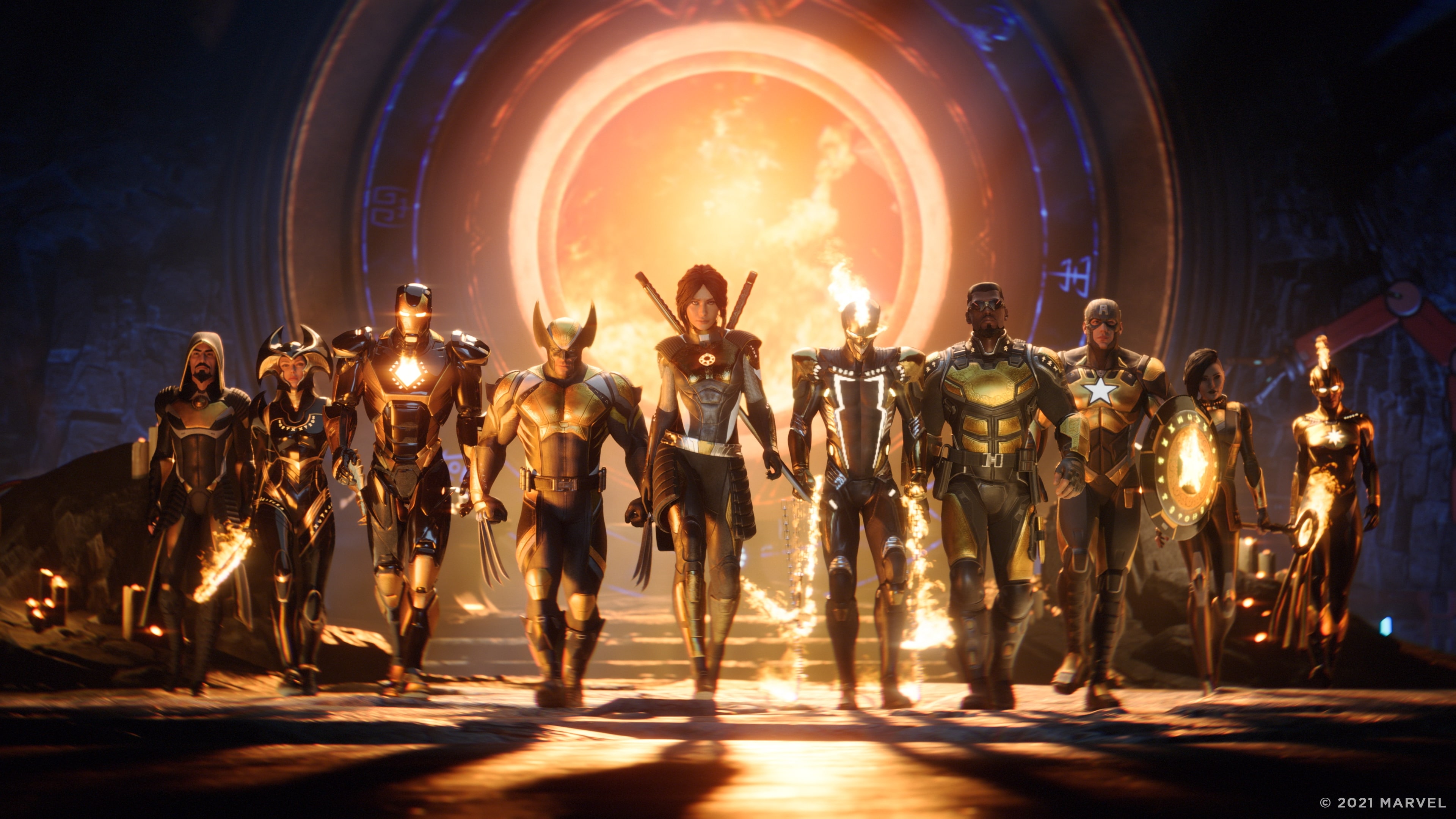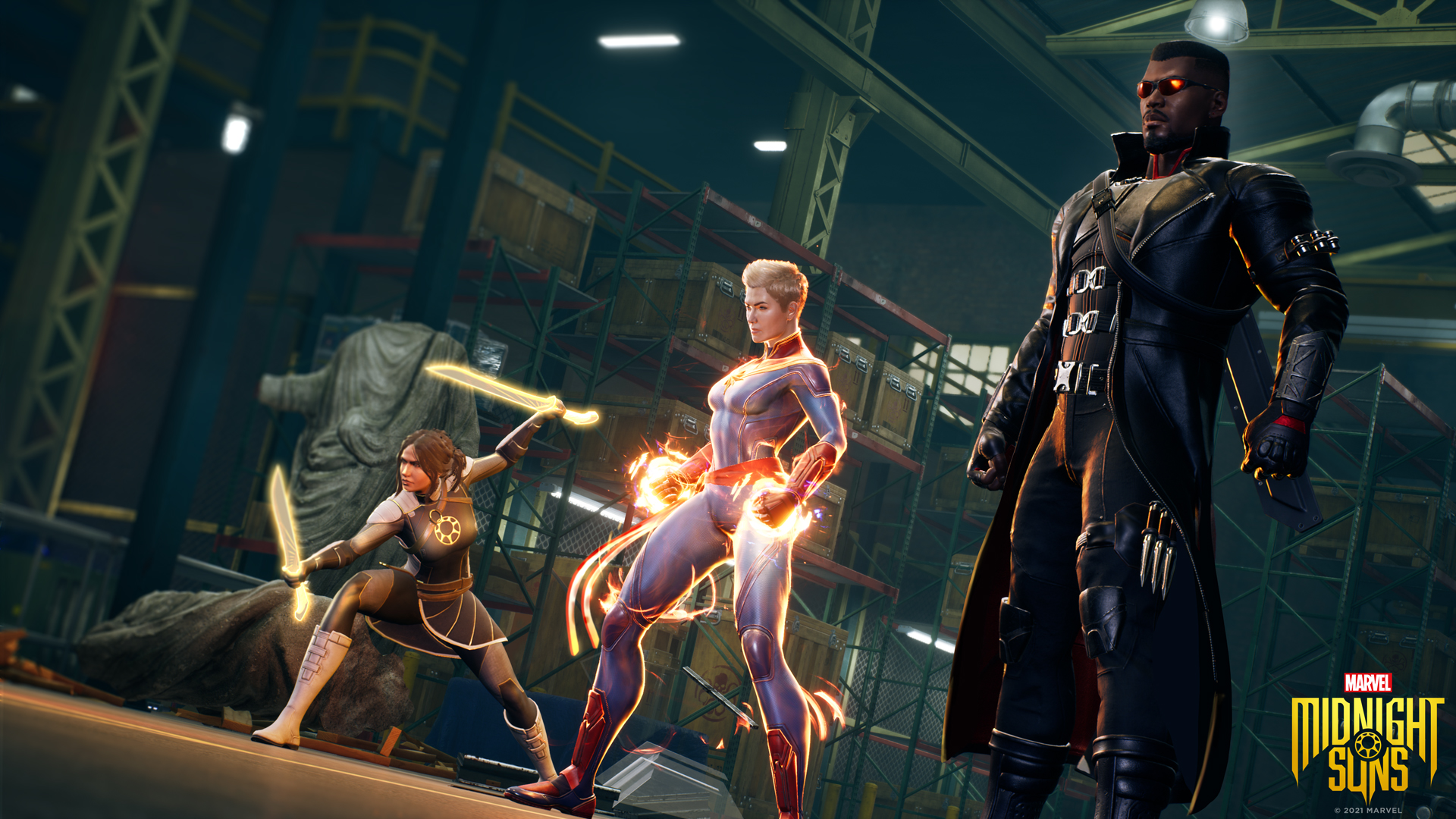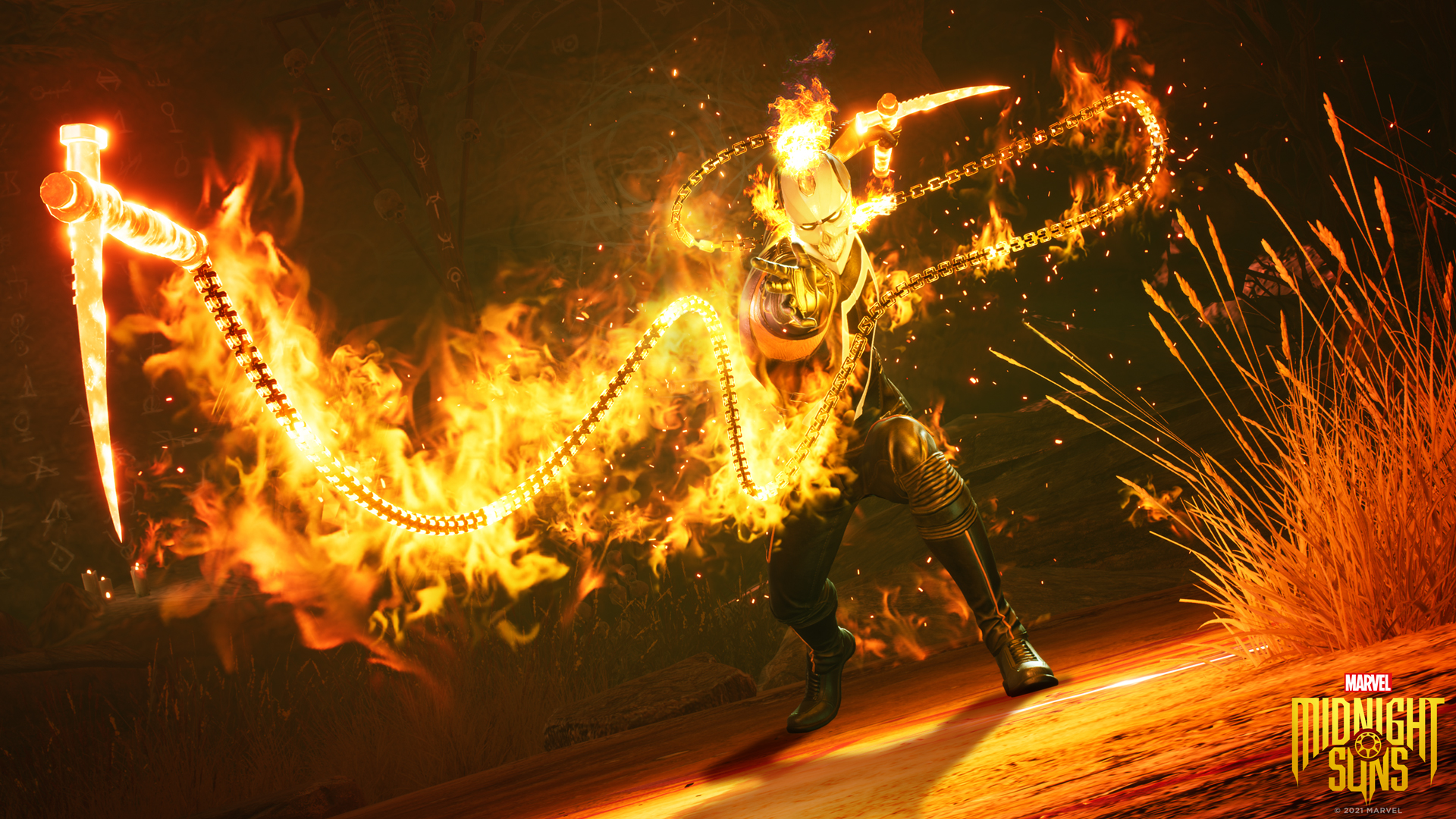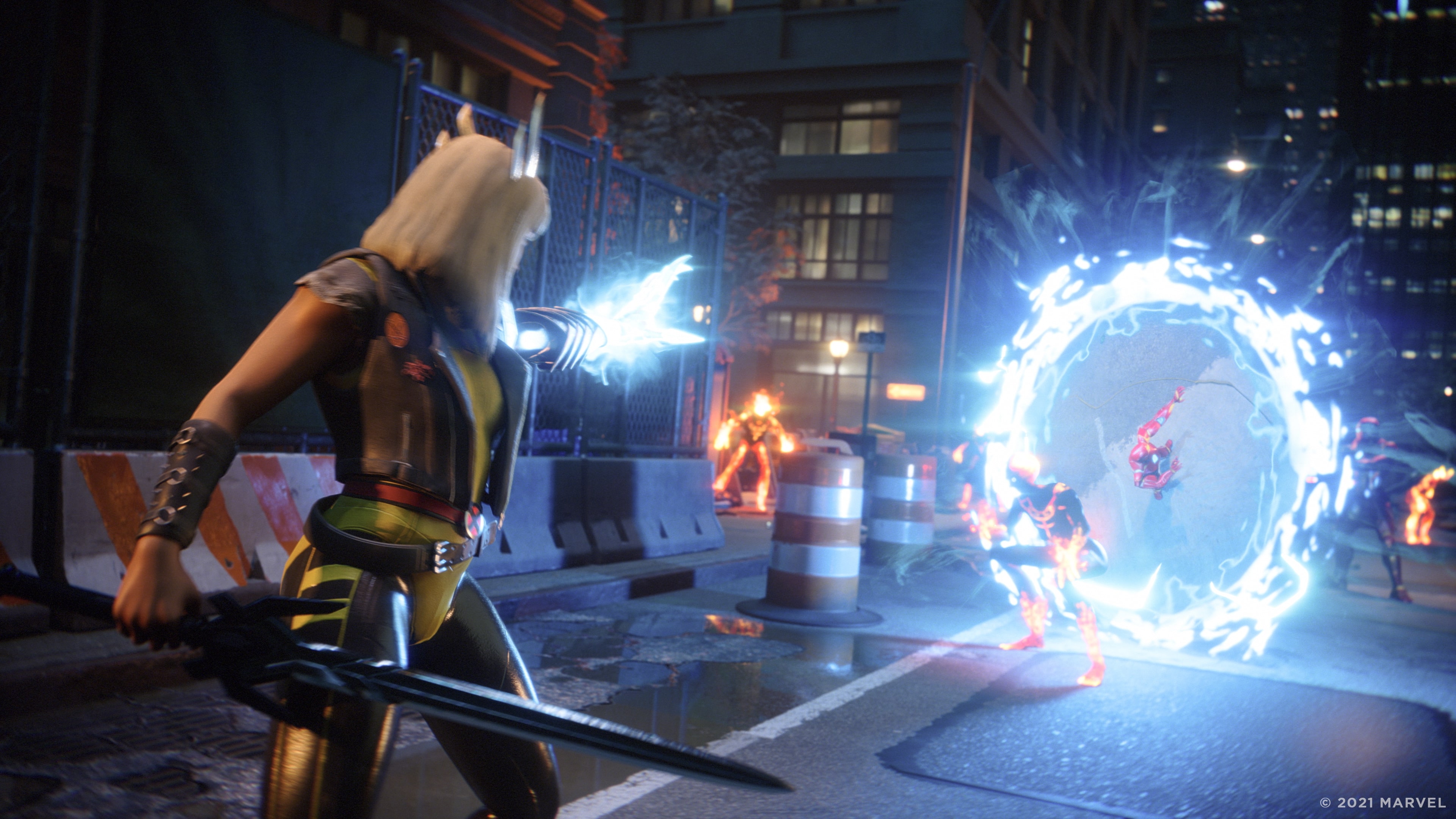Jake Solomon says Marvel's Midnight Suns maintains XCOM's spontaneous storytelling
"It is hard to tell a more powerful story than the one a player tells in their head"

When I first clapped eyes on Marvel's Midnight Suns, I thought of Scarface and Grand Theft Auto: Vice City. If you've been following the pre-release promotion for Firaxis' upcoming superhero-infused tactical RPG to this point, you'll already know that it has little in common with either of these things. But when I think back to the first time I filled the shoes of Tommy Vercetti in the early '00s, I think of roleplaying as the main character in Brian De Palma's 1983 gangster film, Tony Montana. Whenever we play superhero games, part of us is roleplaying as their costume-donning protagonists. When Radical Entertainment's Scarface: The World is Yours launched in 2006, I finally got to be Tony Montana. And in Marvel's Midnight Suns, for the first time in any Marvel game to date, we will finally get to customize our own avatars and fight alongside some of the most distinguished Marvel characters of all time.
That's a pretty big deal, and one I'm sure Marvel fans far and wide are excited about. It's also a lot of pressure dev-side, but it's an idea Firaxis pushed hard for from the outset. "Not a lot of ideas stick from the very beginning," says creative director Jake Solomon. "But we wanted it from the start, and Marvel was the best partner for it. They knew it wasn't going to be easy – we had to make sure the character was appropriate and cool, even the color-blocking of the costume. All of this had to meet a certain Marvel standard, but they were into it."
From a combat perspective, Solomon acknowledges the high standards set by the best superhero games out there already. But by putting yourself into Marvel's Midnight Suns as a playable character – known in-game as The Hunter – and by living alongside the game's cast of world-saving stars in its The Abbey headquarters, the scope for storytelling and deep role-playing is also huge. "We think we've done combat well here in a new way too," Solomon adds. "But the fantasy that we were really excited about, and I think this applies especially to the people who like the movies and the comics, it's that it's just as exciting to see the heroes outside of combat, and see them either in conflict or see them form friendships behind the scenes."
Be yourself


Take a look at all the Marvel's Midnight Suns characters available in the game as well as the ones we think are best
Furthering the case for storytelling driven by the player's customizable character in Marvel's Midnight Suns, game designer Joe Weinhoffer reckons doing it any other way would have been too restrictive. Having players assume control of, say, Spider-Man or Iron Man instead would have come with a degree of prohibitive baggage which would ultimately have prevented self-expression. "Even though it definitely put a lot of pressure on us – it was a lot of work to make sure we were able to craft The Hunter to still be the player's avatar and build this new character – it was also, in a lot of ways, very freeing, because we don't have to worry about the expectations that underpin Marvel Heroes. You can just be yourself, and that gave us a lot of flexibility."
Both Solomon and Weinhoffer were key players in the creation of Firaxis' reimagining of the XCOM turn-based strategy series – 2012's XCOM: Enemy Unknown and 2016's XCOM 2 – however it's since been well-documented that Marvel's Midnight Suns is not 'XCOM-but-Marvel'. In Midnight Suns, for example, you're a powerhouse whose enemies run scared from you, and not the other way around. The game balances consistent abilities with tension-laced combat, and includes deck-building mechanics that, while adding an entirely new layer of strategic depth, stop short of full-blown TCG territory. And, as you might expect given its rich and exhaustive source material, scripted narrative plays a far bigger part in Midnight Suns' storytelling compared to its XCOM counterparts.
To the latter end, one of my favorite features of XCOM is the spontaneous, interpretive storytelling tools it offers players. When you work with the same squad for long periods of time, you form bonds with certain soldiers. You learn their habits in combat, their qualities, their shortcomings, and who they seem to work best with while shooting the crap out of their alien adversaries. In XCOM, you are permanently the underdog, and almost always on the backfoot. You feel the pain of the injured, and mourn the dead who fall on the battlefield never to return. Solomon assures me that while scripted narrative plays a big part throughout Marvel's Midnight Suns' prospective 60-hour runtime, these incidental moments, where players spin their own tales in their own heads, still have a key part to play here.

"It's since been well-documented that Marvel's Midnight Suns is not 'XCOM-but-Marvel'."
Solomon says: "It is hard to tell a more powerful story than the one a player tells in their head. I still believe that, even with all the scripted narrative – the story that a player tells in their head is hard to beat. And we all have that with XCOM. You know, even the guys who, I swear to God, would miss shots so much, you end up developing a love for them. You'd be like: 'Oh, this dumb bastard, he never hits his shot'. But everybody loves him, and you've nicknamed him something, or you dress him a certain way just because of that. It's so hard to beat that type of narrative."
Weekly digests, tales from the communities you love, and more
"Because these Marvel characters are established, we have a tonne of scripted narrative. But, you still develop a relationship with these heroes that's unique, even from playthrough to playthrough because their gameplay is still customizable. You still can choose these heroes' abilities – if it's Captain Marvel, or if it's Blade, or if it's whoever, you can choose their abilities, you can deck them out a certain way. Later in the game, you get these things called mods, and then all of a sudden, the heroes' abilities get these random perks added to them. And then all of a sudden you think: 'Oh, this ability, which I didn't love before, now, it's become the most powerful thing in the game'. [With that], you still get the memories from combat, and you still build your own story from gameplay."
Weinhoffer agrees, adding: "Depending on how you craft and customize your Hunter, and the heroes that you choose to take into combat more than others, you can end up feeling very different about the story. You might say: 'Okay, I'm going to focus The Hunter on all of her life abilities, and push her to be the perfect paragon of justice heroes. She's going to ally with Captain America and Captain Marvel, and that's a squad that's going to feel a certain way in combat, and see its relationships develop in a very specific way. You might then start another playthrough and do a 180, being way more antihero, going more dark side of the balance, allying with Blade and Ghost Rider and feeling very different in both narrative and gameplay terms, and in the conversations and relationships you'll have over the course of the story."
Weight of the world

"Even the folks at Marvel were like: 'Oh yeah, these guys are hardcore Marvel fans,' and then, with that, we could speak with a level of trust."
As Marvel's Midnight Suns marches towards its December 2 launch date, we've already heard how it's a faster and darker tactical RPG from the team behind XCOM. We've heard how anime and JRPGs make it a better strategy game, and we've learned what it's like to go hands-on with a promising Marvel strategy game hiding a slick RPG. As Solomon and Weinhoffer outline above, Marvel's Midnight Suns is also a game that's looking to the future, pushing the boundaries of Firaxis' skill set, while realizing a dream among a team full of passionate Marvel fans. Indeed, this isn't XCOM-but-Marvel at all, and that's almost certainly a good thing. But there are similarities between this game's imminent launch and XCOM: Enemy Unknown's 10 years ago, when Firaxis put its own spin on an already well-respected entity.
With all due respect to Julian Gollop's MicroProse and the original Xcom games of the late '90s and early '00s, Marvel marks a far bigger suitor this time around, with a bigger, and, crucially, more vocal fanbase. Is chasing that pressure and scrutiny something Firaxis actively seeks out? Solomon laughs, before saying: "Well, I don't think we choose that. But it is funny. I had the exact same feeling when we were announcing Midnight Suns that I had when we were announcing Enemy Unknown. It was the exact same."
"We were immediately dealing with the audience, and, obviously, this market is enormous. We had to weather the storm and say: 'Look, let's just make sure that people understand that we are also very passionate about this. We understand any concerns they have that wouldn't be different from concerns we have'. And so, we just tried to talk as much as possible. And then people start to go: 'Oh, okay. I guess… I guess they know what they're talking about'. They could see that we're passionate fans too. One of the reasons we've got such a good relationship with Marvel is because we've been very free with them and they've been very free with us. Even the folks at Marvel were like: 'Oh yeah, these guys are hardcore Marvel fans,' and then, with that, we could speak with a level of trust. Dealing with passionate fan bases, then – it's not unfamiliar. It's not necessarily something we look for, but we are familiar with it."
Weinhoffer nods in agreement, and adds: "I take that any day over dealing with an unpassionate audience!"
Marvel's Midnight Suns is due on December 2, 2022 for PS5, Xbox Series X, and PC.
Here are some of the best superhero games of all time

Joe Donnelly is a sports editor from Glasgow and former features editor at GamesRadar+. A mental health advocate, Joe has written about video games and mental health for The Guardian, New Statesman, VICE, PC Gamer and many more, and believes the interactive nature of video games makes them uniquely placed to educate and inform. His book Checkpoint considers the complex intersections of video games and mental health, and was shortlisted for Scotland's National Book of the Year for non-fiction in 2021. As familiar with the streets of Los Santos as he is the west of Scotland, Joe can often be found living his best and worst lives in GTA Online and its PC role-playing scene.


